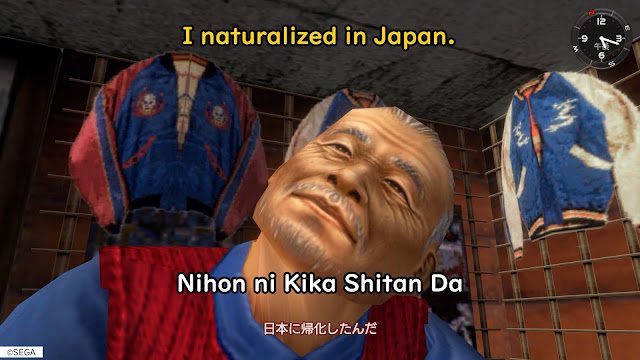If you've ever played Shenmue before, then you've no doubt ran into this infamous line of dialog.
The line of dialog in question being:
“Years ago...I was Chinese. Now I’m a Naturalized Japanese. In China, my name was Su Jian Ren.”
Sounds odd, right?
Now here is the original Japanese as presented in game:
--------------------
昔、中国人だったからだよ。日本に帰化したんだ。中国にいたときの名は....
Mukashi, Chugoku Jin Datta Kara Da Yo, Nihon Ni Kika Shitan Da. Chugoku Ni Ita Toki No Na Wa….
“Because long ago, I was Chinese. I naturalized in Japan. In China, my name was Su Jian Ren.”
Still sounds odd, doesn't it?
One of the major issues with Shenmue's original translation is that they translated everything so directly from Japanese to English. As such, it highlights the, at times, incompatibilities between the languages.
The line in the original translation is very much the same as what is said in Japanese. That’s fine with things like honorifics, but elsewhere it is awkward and stilted.
Alternatively, they could have translated it more like this:
“Years ago, when I grew up in China, my name was Su Jian Ren. I changed it when I naturalized.”
However, the concept of Naturalization is still lost in translation here. To keep it simple, Japanese naturalization typically requires a foreigner taking a Japanese name. For example, a number of Rikishi (Sumo Wrestlers) have done this. Most notably Akebano Taro (born Chad Rowan.) This is why Itoi-san mentions his original Chinese name as Su Jian Ren. Only this detail is ultimately lost for those unknowing of the cultural differences.
 |
| Akebano Taro on the left (born Chad Rowan) |
Therefore Itoi-san has long since taken a Japanese name and now just considers himself a natural Japanese citizen. But alas, this cultural detail is lost in translation and therefore the line of dialog just comes across as stilted.
While Shenmue does stay very true to the Japanese script, it also unfortunately highlights the lost subtle detail going between language and culture.
-Daniel M







0 comments:
Post a Comment